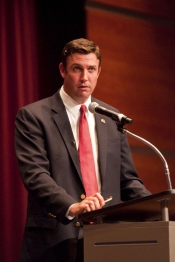
By Miriam Raftery
November 9, 2011 (San Diego’s East County) – “I’ve been a working man for 40 years,” says David Secor, a military veteran and resident of Crest who has thrown his hat in the ring as a Democratic candidate for the Congressional seat held currently by Republican Duncan D. Hunter.
“I am running to support the working men and women of this district…to be the representative of all the people in the district and to restore the American dream for all of our citizens.” (View a video of Secor speaking on addressing joblessness: http://www.davidsecorforcongress.com/jobvid.html)
A veteran of Viet Nam, blue-collar and white-collar careers
The son of a miner, Secor moved to San Diego from Wisconsin at age 12, after the iron mine closed down and his father’s job got outsourced. “We all piled into a Chevy pickup with a camper shell and we headed for California,” he recalls. “It was right out of Grapes of Wrath. If it didn’t fit in that truck, it got left behind.” He grew up in San Diego County, attending local schools. In 1967, he was drafted and fought in the TET offensive with Charlie Company 228 Aviation Battalion in the First Air Cavalry division, becoming a platoon leader. Returning home, he graduated from San Diego State University with a bachelor’s degree in speech communication.
Secor says he has held jobs as a truck driver, construction worker, and college instructor. He’s picked oranges as a farm worker in the Brazeros program, hoisted heavy loads as a warehouse worker, and done clean-up work as a hotel housekeeper. Earlier this year, he retired after 19 years as a San Diego Superior Court clerk in order to run for office. Also a Cedar Fire survivor, he recently married his childhood sweetheart, a retired Christian school teacher.
Values and platform
“We know people in this district are generally conservative, but what does conservative really mean?” he asks. “It means holding onto those things of value. What America used to be, conservatively speaking, was the land of opportunity where you could come and start from nothing and go places, but now that opportunity is gone,” he says. “We’ve had in the last few years this total meltdown of our financial system which has put so many people out of work…Yet we spend more on defense than the rest of the world combined, at a time when our infrastructure, our education, and our healthcare system are all under attack.” While supporting a strong defense, he adds, “We must move away from the waste in defense and that will be enough to put millions of people to work.”
Secor is running on a platform of creating jobs and rebuilding the economy, stopping the housing crisis, protecting Social Security and Medicare, strengthening public education, fair taxation and deficit reduction, restoring regulations on big banks to protect consumers, reexamining foreign trade agreements to bring home American jobs, supporting sustainable and clean energy, and improving wildfire protection for our region.
He respects Rep. Hunter’s military service. But Secor believes his own qualifications are more broad-based and relevant. “I’m a veteran too—not only of my time in 1968-69 with the First Air Cavalry Division, “ he notes, “but I am also a veteran of 40 years in the trenches with the working men and women in our district, the people who get up every day and fight to put food on the table, fight to meet mortgage payments, fight to education their children-- and the people fighting for Social Security and Medicare, because they need those to survive.”
Secor will face off in the Democratic primary against Connie Frankowiak, has previously run for the office in 2006, 2008 and 2010 but never secured her party’s nomination, receiving no more than 29.3% of the primary votes. Secor says he has been a life-long Democrat, but is running as an outsider, not having been involved in party political organizations before.
He urges people in the district to make a “business decision” and terminate Hunter’s job. “He’s been sent to Washington to do our business, not the business of special interests and the extreme right. The people are ready for a change.”
Hunter’s Record in Congress vs. Secor’s Solutions
 Secor believes the Congressman has lost touch with the needs of most people in the district (currently the 52nd district, but soon to become the 50th district for the 2012 election due to redistricting).
Secor believes the Congressman has lost touch with the needs of most people in the district (currently the 52nd district, but soon to become the 50th district for the 2012 election due to redistricting).
“To quote the Bible, `By their fruits shall ye know them,’” he says. “It’s obvious by his record that our Congressman has ignored the people of his district. Instead, he’s decided to represent corporate donors and the extremist agenda of the far right,” Secor says. “Mr. Hunter has done less than nothing for the unemployed, the under-employed, or even the working men and women whose jobs are still at risk.”
Unemployment
He faults Hunter for voting against extending unemployment benefits at a time when 58.1 million Americans are unemployed—including 12 percent of Californians. “With our returning combat veterans, unemployment is over 30 percent,” he added. “Our representative, Mr. Hunter, gives nothing but lip service to real needs of the middle class, even as many of us face unemployment, foreclosure and bankruptcy.”
Social Security and Medicare
He also criticizes Hunter’s views on Social Security. “Mr. Hunter, like most of those on the extreme right, wants to privatize Social Security. In other words, you wouldn’t Social Security—you would have to fund your own 401K.” For the average working person, he believes that’s unrealistic. “There’s no way to raise a family and buy a home and be able to fund a 401K.”
By contrast, Secor pledges, “I am absolutely committed to Social Security. No question. You know who else was committed to it? Ronald Reagan.” He recalls President Reagan signing a bill to strengthen Social Security. “Reagan said `Today we reaffirm Franklin Delano Roosevelt’s commitment that Social Security must always provide a secure and stable base, so that older Americans may live in dignity,’” Secor points out. “Mr. Hunter said that Ronald Rea gan could never get elected today, because he was too moderate.”
gan could never get elected today, because he was too moderate.”
He also expressed alarm over other Hunter actions that he believes are harmful to senior citizens. “He voted for the Paul Ryan budget which said that Medicare should be done away with and replaced with a voucher program,” he noted, “but also in that budget was another trillion dollars or so in tax breaks for the wealthy. The agenda is clear: what the extremists want to do is tell you `This is a jungle; you’re on your own. That’s not the American I know.”
Poverty
Secor is also outspoken on the need to reduce poverty rates—an issue he says Hunter has ignored. “The poverty rate in America is now 15.1 percent, the highest in over 27 years, noted, citing newly released Census data. We have 46.2 million people living in poverty,” he said. “One third of people born into the middle class have dropped below the poverty line—it’s a staggering statistic. ”In El Cajon, the heart of East County, the poverty rate is nearly 30 percent, Secor added.
Jobs
“Mr. Hunter has done nothing to bring jobs to the people of District 50,” he says, dismissing a jobs fair held by Hunter as a bandaid approach. “When asked what his jobs plan was, Mr. Hunter replied that his jobs plan was to see that the President of the United States loses his job…Mr. Hunter, your constituents are facing joblessness, home foreclosures, education cuts, insurance rate hikes…Your inaction is inexcusable.”
 The Democratic candidate recently spoke at a jobless rally in San Diego over Labor Day weekend. “Duncan Hunter wasn’t there,” he observed. “When you’re born in privilege you have no concept of what a person goes through."
The Democratic candidate recently spoke at a jobless rally in San Diego over Labor Day weekend. “Duncan Hunter wasn’t there,” he observed. “When you’re born in privilege you have no concept of what a person goes through."
He added, "I would like to ask him, have you ever known what it’s like to be poor? I have. Have you ever been on unemployment? I was unemployed for 10 months, due to lack of work, my employer said he would rehire me. Being out of work is one of the most difficult and stressful things that you can go through. Some people have been unemployed so long, they’re just broken. They lose their homes. They have to accept charity. Some families are living in run-down hotels.”
Energy independent and sustainable jobs for East County
Secor says he is aware of groups and individuals interested in bringing green jobs in sustainable industries to East County. “It is the future,” he says of alternative energy solutions to replace fossil fuels including foreign oil, “and not only that, it’s a national security issue…I want to sit down with these groups and find out what we can do in Congress to make things happen here in the district. The Republican party has not been behind green energy and I don’t understand it, because they are all about defense.”
 He added, “The idea that we could get away from SDG&E and provide our own power, that excess power in your house would go back to the electrical grid and you could get a payment or credit—all these things need to be incentivized.” China has taken the lead from the U.S. in alternative energy development by providing incentives for solar and other emerging technologies, he notes.
He added, “The idea that we could get away from SDG&E and provide our own power, that excess power in your house would go back to the electrical grid and you could get a payment or credit—all these things need to be incentivized.” China has taken the lead from the U.S. in alternative energy development by providing incentives for solar and other emerging technologies, he notes.
He wants to see federal investment in solar energy production incentives, as well as some wind energy, though he acknowledges “There are issues with wind,” citing health, aesthetic and environmental concerns raised by East County residents over industrial-scale wind projects built or proposed here. “Algae is going to be huge – algae-based fuels are so much better than corn-based,” he said, noting that the U.S. Navy is preparing to sail a green fleet around the world and research is underway into algae-based jet fuels. “Once they get that technology into a marketable situation, it couldn’t be better for our environment and for energy independence.”
Supporting jobs creation and infrastructure
Secor says focus on the war on terror, while important, has overshadowed what he terms the “international war on jobs.” While Hunter has taken large sums from lobbyists for defense contractors and voted for major Defense expenditures, Secor notes that the multiplier effect for job creation is far higher in other areas. “For every billion dollars you put into defense, you can expect it will create 8,500 jobs. But $1 billion invested in infrastructure, including education and healthcare, equals 25,000 jobs.” Crumbling infrastructure also costs businesses money, he notes, citing delays in deliveries of product from flowers to UPS packages as examples. “If we don’t deal with infrastructure, we are going to become a third rate nation,” he adds.
He voices concern over GOP efforts to eliminate prevailing wage rules for federal jobs. “When they talk about saving money, it always comes down to `cut wages, cut wages,’” he observes. “It’s the only thing they care about.”
Cutting military waste and ending wars
Secor cites $300 billion in waste , fraud and abuse that has occurred with private military contractors in Iraq and Afghanistan as an example of money poorly spent. He also believes it is time to bring home troops from Iraq and Afghanistan, and invest in improved intelligence operations and high-tech options such as the predator drones striking at terrorists in Somalia and Yemen. “The issue, whenever we commit combat troops, is simple. Does that threat pse an imminent threat to the security of the United States?” Secor supported the invasion of Afghanistan but notes that when Osama bin Ladin was cornered in Tora Bora, Defense Secretary Donald Rumsfeld turned down requests to send reinforcements for our special forces, allowing bin Ladin to escape. “In the end, 28 seals captured bin Ladin in Pakistan,” he notes. He opposed the invasion of Iraq, however, and believes the public was misled about the situation.
“Our troops have been magnificent,” he says. “We are extremely proud of their courage and determination to complete the mission, but they must now be brought home.”
Revisiting free trade agreements
He also supports renegotiating—or scrapping—free trade agreements that have led to loss of U.S. jobs.“Outsourcing has compromised national security,” he states. “We have lost 900,000 jobs due to NAFTA and they are still pressing forward on other free trade agreements such as Columbia.” He notes that 2,850 Columbians have been murdered in the past 25 years for trying to organize labor; another 10,000 labor organized have been kidnapped, tortured or disappeared. “There is nothing fair about it,” he said, noting that products shipped here could be made with “slave labor.” As for U.S. goods sent to China, he observes, “They put a 25 percent tariff on it. When they send their goods to us, we have a tarrif of just 2.5 percent. There is nothing fair about it…All these trade deals need to be relooked at.”
Healthcare and a clean environment
 “Talk about healthcare—he (Hunter) has had government healthcare his entire life,” Secor notes. “I’d like to ask him, if government healthcare is okay for you, then why isn’t it an option for some poor person? We have 50 million people with no healthcare insurance.” He adds, “Duncan Hunter also voted to repeal the 1972 Clean Water Act, which is beyond belief—he and the entire Republican delegation because they and their corporate owners don’t want to clean up after themselves. Fortunately the Senate stopped that.”
“Talk about healthcare—he (Hunter) has had government healthcare his entire life,” Secor notes. “I’d like to ask him, if government healthcare is okay for you, then why isn’t it an option for some poor person? We have 50 million people with no healthcare insurance.” He adds, “Duncan Hunter also voted to repeal the 1972 Clean Water Act, which is beyond belief—he and the entire Republican delegation because they and their corporate owners don’t want to clean up after themselves. Fortunately the Senate stopped that.”
He believes the GOP has shown a callousness toward people who need healthcare, citing a Republican debate at which a question was asked about a young man in a coma without healthcare should be allowed to die. “People yelled `Yeah.’ That is sick,’” he said, “but these people are totally serious.” He faults Hunter for taking government healthcare while opposing measures to help millions of uninsured Americans have access to affordable, quality healthcare. He supports improving the President’s healthcare reforms, not repealing them.
Women’s health
Secor also characterizes Hunter as an extremist on issues that impact women’s health. “He introduced a bill to ban abortion even for women whose lives are in danger…That is the most extreme position I’ve ever heard of.” The bill made no exceptions for rape or incest, either. “Philosophically, I am opposed to abortion as a form of birth control, but I would never tell a woman how to control her body…That’s between her, her God, and her doctor,” he says. He also believes that creating jobs and improving healthcare access will reduce abortions among women who seek them due to economic pressures.
He also disagrees with Hunter voting to eliminate funds even for breast exams, cervical cancer screenings and birth control provided through Planned Parenthood. “To do away with healthcare for millions of women because of your moral stance on a particular issue is simply wrong,” he says.
Immigration
On illegal immigration, he believes the best solution is preventing employers from hiring undocumented workers. “If there are real sanctions they won’t come; they come because there is work,” he says.
Tax reforms to eliminate corporate giveaways
 Secor wants to close loopholes that provide subsidies to big oil companies that are making “the most profits in their histories, while we are also giving them $43.6 billion in subsidies.” he says. “In April, Republicans defeated a measure to eliminate this theft of taxpayer money.”
Secor wants to close loopholes that provide subsidies to big oil companies that are making “the most profits in their histories, while we are also giving them $43.6 billion in subsidies.” he says. “In April, Republicans defeated a measure to eliminate this theft of taxpayer money.”
He wants to see an overhaul of the tax code to eliminate or cut other “giveaways” to other industries and to assure that profitable corporations pay their fair share. He notes that “38 percent of corporations pay no taxes.”
Helping small businesses
By contrast, he believes small businesses need more help. “They’re the ones I’m concerned about,” he declares. “I want them to have bridge loans, if you can’t make payroll or haven’t received money you’re supposed to get, you should be able to get that short loan until your bill is paid,” he said, adding that he is talking to local bankers about standards and rules for bridge loans. “Duncan Hunter voted against a bill to help community banks lend to small businesses,” he added.
Reining in big banks and protecting consumers
He faults President Barack Obama for not requiring a restructuring of the financial industry instead of handing bailouts to big banks. “I would reinstate Glass Stegall,” he says of landmark financial regulations enacted under President Franklin D. Roosevelt in the 1930s to protect consumers. Key provisions were repealed in 1999 under President Bill Clinton. “Glass Steagall kept this country in great stead for 50 years,” he notes. “Why should banks be allowed to gamble with our money? They can take enormous risks and actually commit fraud, put all these junk bonds and credit default swamps out there, and they were assisted by Moody’s rating agency which recently downgraded the U.S.”
When Moody’s gave “junk” a triple A rating, it impacted Secor personally as a County employee working at the court system. The County made investments with pension funds, relying on triple A ratings from Moody’s for “junk” he says. “I’m going to be getting $300 less a month or so in my pension, because the County pension fund took a $2 billion hit when the stock market crashed.” He wants to see banks “gamble with their own money. If they lose, they lose and they have to shut down.”
Education
Secor, who attended public schools, reflects on the decline in education quality in California. “When I was young, we had the best public education in the world. Today, that’s very far from true. We must return to that position…All of our children need the best we can deliver Mr. Hunter and his allies are attempting to destroy public education by defunding schools and demonizing teachers. Their ultimate goal is to replace it with charter schools so that their operators can get access to taxpayer dollars.” While noting that some charter schools have excelled in test scores, he observes that others have proven to have worse records than public schools. “Charters are not magic bullets,” he concludes.
Secor, a fire survivor, seeks stronger fire protections
 The need for stronger fire prevention and protection is an issue that Secor understands firsthand. During the 2003 Harris wildfire, Secor had to evacuate his home in Crest, a town devastated by the blaze. “I went to my sister’s house in El Cajon and watched as the whole hill was on fire,” he recalls. “I had to wait three days to come back and find out if the house was still here…I called a friend and he said my home was gone; it looked like nothing was going to survive.”
The need for stronger fire prevention and protection is an issue that Secor understands firsthand. During the 2003 Harris wildfire, Secor had to evacuate his home in Crest, a town devastated by the blaze. “I went to my sister’s house in El Cajon and watched as the whole hill was on fire,” he recalls. “I had to wait three days to come back and find out if the house was still here…I called a friend and he said my home was gone; it looked like nothing was going to survive.”
Fortunately, Secor later learned that his home did survive the flames, though many neighbors lost their homes. Now he voices concern over the state, county and local fire jurisdictions making cuts “left and right” due to budget pressures.
Perry (Texas Governor and GOP presidential candidate) made 75 percent cuts in firefighting,” he observed following devastating wildfires that have scorched most of Texas. Cutting firefighting can have tragic consequences and in the end, cost more money than it saves, he says. “People’s lives and history can be wiped out in moments; it’s not just money,” he said, pledging to fight for improved defenses and resources to prevent such devastation in our region. “It is a dereliction of your duty to the people of your district if you don’t see that these things are funded,” he maintains. “The federal government can make targeted funds available to local districts or at the state level. To free up funds for beefing up fire protection in East County, he would make cuts in discretionary areas of the budget.
Looking forward for the future
Despite the many problems that our nation faces, Secor remains optimistic about the future. “I believe the country is not at the edge of an abyss like extremists would have us believe,” he said. “We are, however, at a crossroads. Do we continue down this road, or do we choose a new direction to rebuild this great nation? This decision must be made on reason and faith, not on fear, hate and ignorance.”
He praises American ingenuity, citing as an example the recent case of gamers who cracked the protein structure to fight AIDS. “Scientists have been working on this for 12 years; then they put it on a website and invited gamers to crack this protein structure. What the best scientists couldn’t do, these guys did in ten days,” he marvels. “This is the greatest nation in creativity and imagination….It’s going to be a great future if we just do the right things.”
Money in politics
He views money in politics as a corrupting factor that is “poisoning the whole system” in Washington D.C. He drives a car with a signboard that reads “the man versus the machine,” a reference to the corporate and political machinery that typically elects politicians beholden to powerful special interests.
“It’s not that the government is broken. It’s just that big money has bought both parties,“ says Secor, who has vowed not to accept any donations from special interest groups, only individual donations of $100 or less. “The people of our District need to know that money will never play a role in my decisions while in office.” In addition, he promises, “If elected I personally commit to donate 20 percent of my pay to nonprofits and education in District 50.”
He asks voters to weigh Rep. Hunter’s record and make a business-like decision. “The people sent Mr. Hunter to do a job. He has failed us. He must be let go,” he says. “He can then rejoin the private sector and see the job crisis from a different perspective. I’m sure that we all wish him well in his future endeavors.”
Challenges in the race
Secor faces a difficult battle in the 50th Congressional District, where the party registration is predominantly Republican. But he believes the time is ripe for a candidate with a populist message and limited funding to wage a campaign capable of defeating Duncan D. Hunter, who follows in his father’s footsteps in Congress. He believes people in all political parties, as well as many decline-to-state voters, are ready for a change.
How does he plan to wage a viable campaign without special interest funding?
He seeks volunteers to man phone banks and walk precincts. In addition to those traditional campaign methods, he also seeks to maximize use of online communications and sites such as Facebook, YouTube and Twitter. On his Twitter feed , he calls himself a voice for the silent majority. His tweets range from commentary on issues to presidential candidates. On YouTube, voters can view his testimony against the SDG&E rate hike (http://www.youtube.com/user/DavidSecor#p/a/u/2/Vn4y9CJPURE) . On his website, viewers can see him speak on his experience and plan to “fight for working men and women.” http://www.davidsecorforcongress.com/jobvid.html
“The Internet and all the social media websites are crucial to me to get my message out,” Secor says, citing the Arab spring as an example of what social media can achieve. “Four weeks before he was toppled, Mubarak was one of the most powerful men in the Middle East,” he says of the Egyptian president ousted by a populist uprising. “Now this man is gone. Social networks are the voice of the common person. You don’t have to have money or lobbyists pouring in. If you can reach the people through social media, the word will get out and things will happen.”
His own campaign is a “mighty task,” he concludes. But he adds, “I am climbing that mountain—and I will not be deterred.”
To learn more about Secor’s candidacy, visit his website at www.davidsecorforcongress.com, or follow him on Twitter @DavidSecor2012.







Comments
WOW! If what you say is true
WOW! If what you say is true and you will stay on point, then Sir - you just may have my vote come election time. What a refreshing view from a politician - 'by the people, for the people'... and BTW - "thanks for your service".